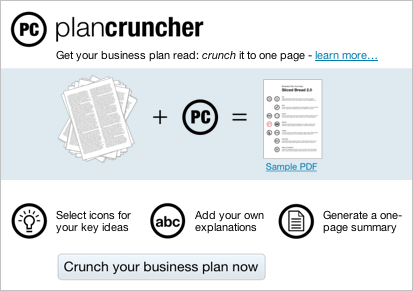Plan Cruncher - Play! in production

At Lunatech, we recently decided to build a small web application to implement one of our ideas for generating business plan summaries. We needed to get this running on-line as quickly as possible, with minimal time spent coding, so we chose to build it using the Play! framework. The result was fast development, clean code, easy deployment and an instantly popular web application - http://plancruncher.com/.
Plan Cruncher is born
On 11 February, I presented an idea for ‘Business plan symbology’ at the Lean Start-up event organised by Lunatech Ventures. Basically, the idea is that if you choose a few standard icons that apply to your start-up idea, then you can put together a standard one-page summary of your business plan, with standard text, that avoids the length of normal business plans.
We had a great discussion about the idea, and got lots of positive feedback, including Invold.com and turtlethink.com blog posts, so we decided to do the lean and agile thing, and get the idea on-line. This meant that we needed to code a simple web application that would allow people to select some icons, and generate and e-mail a PDF of the business plan summary.
Play! framework
This is the kind of thing that PHP is ideal for - hacking-together a quick web application. PHP is not our thing though, because of the mess you inevitably end up with, which is one of the reasons why we prefer to use Java. However, while we normally work with the Java Enterprise Edition platform, that would be far too big a sledgehammer for this kind of small web application. We just want all of those Java libraries to be available in case we need them.
The new Java web application framework in the ‘best of both worlds’ category is the Play! framework, which massively simplifies much of the unnecessary complexity that has accumulated among Java EE development conventions. Like PHP, Play! is by and for web developers, bringing a different set of values to the kind of framework favoured by the heavy-weight Java EE community.
In particular, Play! was ideal for this project, because of the development speed you get from its edit-save-reload page development cycle (no build or deployment steps required), the cleanness and brevity of the code you end up writing (no code-generation), and the ease of integrating things like the Play! PDF module. We also wanted it to be easy to push new changes to the live application on a daily basis without interrupting users, because we were going to release-early, with a new idea that we were still thinking about.
plancruncher.com
Everything worked out beautifully: despite me being on holiday for a week, and Nicolas having other work to do, we had Plan Cruncher in production at http://plancruncher.com/ within a couple of weeks, after spending about two days each on design, coding and testing. It was fun as well.

After the first release, we released a new version every day for a week or so, to incorporate initial user feedback, as #plancruncher started to find its way around Twitter. Doing this with a stateful web application is a problem, especially if the application server takes a long time to redeploy the application.
We had no such problem with Play! because we set-up two instances of the application, and configured Apache load balancing to switch to the second instance if the first is not available. Since a Play! web application is stateless, you can use this to release a new version, without users noticing the switch from one instance to the next. What’s more, we can deploy a new version of Plan Cruncher (on both instances) in about ten seconds, because Play! application start-up is so fast. Upgrading your Play! applications without downtime explains how this works.
What’s next
Who knows where Plan Cruncher will go from here, but some further development is inevitable. Big projects often start out with a small application like this, which is another reason why we are glad we did not start with PHP.
We are certainly considering localisation, after attention from blogs in the US, Russia, Germany, Italy, Latvia and Japan.
We also have (a long list of) other ideas for lightweight web applications like Plan Cruncher, and it is good to know that we have a platform that offers us rapid development and results in a small amount of clean code. Of course, these are advantages that large applications can also benefit from.
Peter Hilton is a senior software developer at Lunatech Research.
